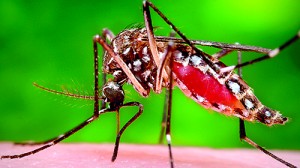Sunday Times 2
Want to repel mosquitoes? There’s an app for that
The muggy weather is creating a ‘perfect storm’ for mosquitoes to descend on our gardens.
But the latest high-tech weapon in the battle against the bloodsuckers doesn’t come in the form or a spray or clip, instead it’s a free app on your smartphone.

The official name for such apps, and other similar technologies, is electronic mosquito repellents, or EMRs. The app doesn't guarantee 100% protection, because 'there are more than 3,500 mosquito species in the world and they all react differently to the repellent (Reuters)
Anti-mosquito apps emit ultrasonic frequencies designed to frighten the mosquitoes away.
They do this by either mimicking the sounds of mosquito predators, such as dragonflies and bats, or by using the sound made by the wings of male insects.
Once a female mosquito has mated, she is said to actively avoid contact with males, so by playing this sound, the females stay away.
The most popular app is called the Anti Mosquito Sonic Repeller.
Its developers claim that the pitch of the sound it produces is so high, most humans don’t notice itIt also comes with various frequencies in order to target different mosquito species within specific locations.
Although, the app does not guarantee 100 per cent protection, because ‘there are more than 3,500 known mosquito species in the world and they all react slightly different to the repellent’.
Other apps that play ‘mosquito sounds’ are designed to annoy people, rather than repel mosquitoes but have been found to serve that purpose by accident.
The official name for such apps, and other similar technologies, is electronic mosquito repellents, or EMRs.
Experts have expressed concern about using these apps as a standalone repellent, however.
Research from the Liverpool School of Tropical Medicine found ‘no evidence of an effect of EMRs on landing rates.
‘Thus there is no evidence that these EMRs could potentially be useful in preventing malaria in humans.’
There is also said to be little evidence female mosquitoes avoid males after they’ve mated.
The Liverpool researchers added that ‘male mosquitoes are actually the ones attracted by the female flight sound, and females normally have a very weak sensitivity for sound compared with the males.’
Wayne Crans, Associate Research Professor in Entomology at Rutgers added mosquitoes are also not known to leave areas hunted by dragonflies. Reviews of the app additionally state that the sound is audible and ‘annoying’.
Malaria, which is among the diseases carried by mosquitoes, kills more than 600,000 people a year and 90 per cent of them live in Sub-Saharan Africa.
© Daily Mail, London

